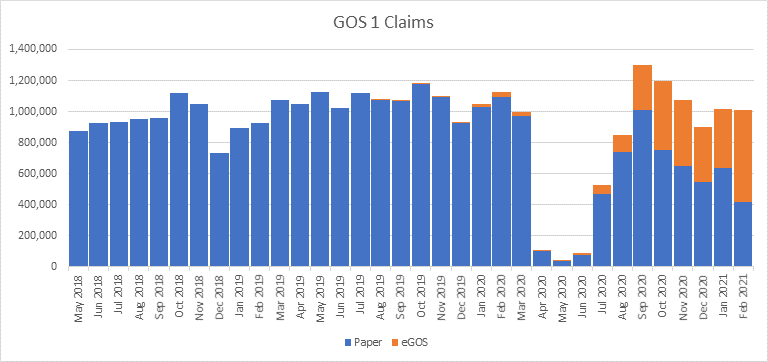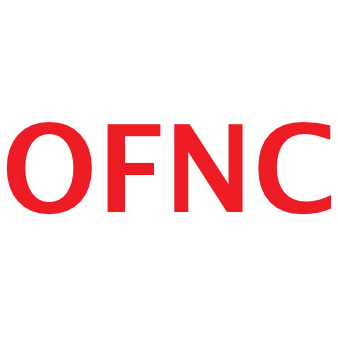05 March 2021
NHS England rejects support proposal for struggling practices
5 March 2021
Several weeks ago the OFNC put clear proposals to NHS England for support for optical practices struggling in the latest round of lockdown restrictions. Many in the sector had responded to our call for evidence on the impact of the new lockdown, demonstrating that targeted support was needed. We proposed a targeted safety net scheme to support practices which had seen a fall of 50% or more in GOS activity. We also proposed continued top-up support for domiciliary providers which have continued to struggle to access patients, particularly in care homes.
On 4 March NHS England told us no further financial support will be made available to practices at present. It gave two reasons for this. One is that its monthly GOS claims data (below) is showing relatively stable activity in January and February 2021. The other is that the additional support offered in autumn 2020 to some fixed practices in areas of deprivation was taken up by fewer than 200 practices, suggesting limited demand for further help.
We reject both these arguments, and we know the profession will be aggrieved at this decision. It shows a lack of regard for the small number of practices that still need help, having struggled to continue to meet eye care needs and provide frontline services throughout the pandemic.
The GOS claims data only gives an aggregate picture. It includes payments for previous months submitted on paper forms, and is distorted by the rollout of eGOS. NHS England accepts that despite the positive picture painted by the data, many practices can show they are suffering from a significant reduction in demand for face-to-face care - but it is not willing to help.

We also strongly disagree with NHS England's interpretation of the low uptake for the autumn 2020 support. We had warned at the time that the complex and restrictive criteria for the support would be a barrier to take-up. That support was also offered in very different circumstances - with lighter lockdown restrictions in most parts of England, without the strong "stay home" messaging from Government that has affected patient confidence since January, and with a more positive outlook for an end to the crisis. However, it provided an important safety net which supported some 200 practices and their patients.
As we have repeatedly explained to NHS England, our proposal for further safety net support would not be needed by many practices, but would enable those needing help to keep their doors open to meet their patient's needs close to home.
Unfortunately NHS England has now made it clear that it is not willing to take these negotiations any further at this time.
We know this will be a blow for the whole sector, and bitterly disappointing news to practices that may now have to reduce their operating hours or turn away patients they have supported throughout the pandemic.
Despite this, we will continue to meet with NHS England to review the impact of the pandemic on activity levels and other data, and to monitor the need for future support for practices for the benefit of patients, the public and the sector.
ENDS
The Optometric Fees Negotiating Committee (OFNC) is the national negotiating body for eye care in England with the Westminster Parliament, the Department of Health and Social Care, and NHS England-NHS Improvement. It comprises the leaders of the UK representative bodies: ABDO, AOP, FODO and BMA (for OMPs) and works in partnerships with the College of Optometrists and the General Optical Council.


 Patients and public
Patients and public
 Policymakers
Policymakers Members
Members News and views
News and views
